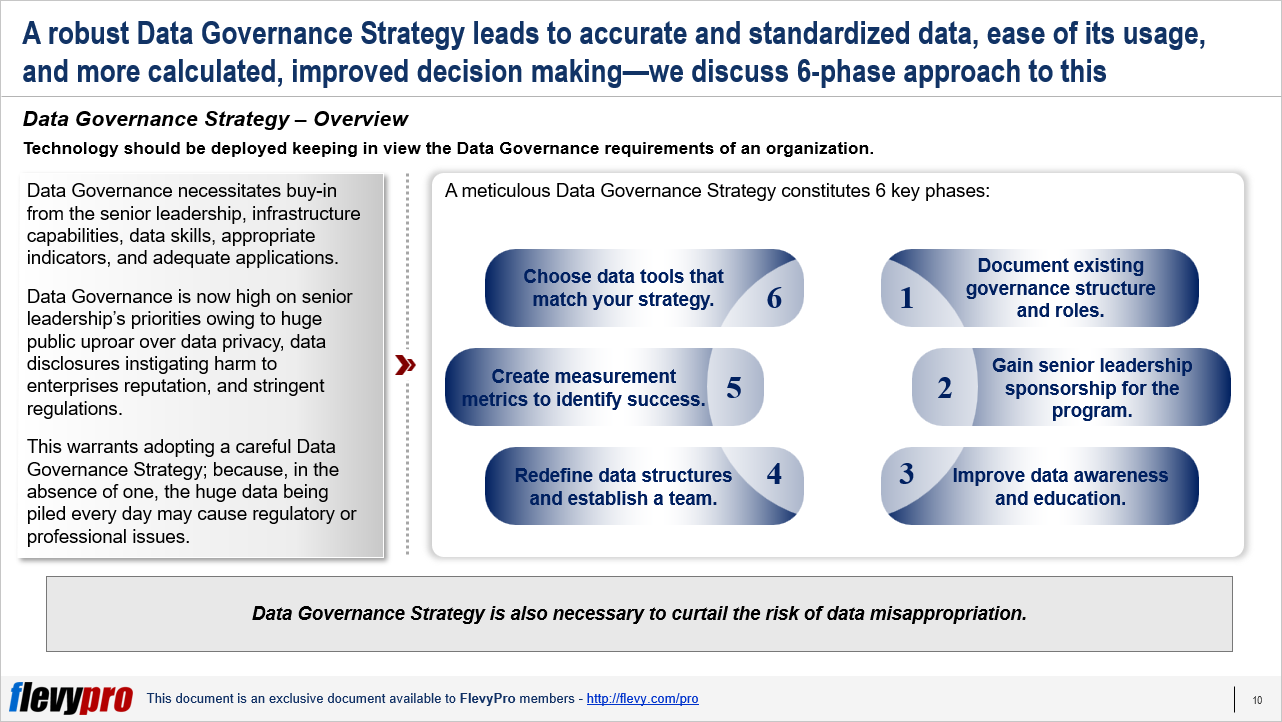Editor's Note: Take a look at our featured best practice, Enterprise Data Management and Governance (30-slide PowerPoint presentation). Unleashing the Potential of Enterprise Data Management: Navigating the Data Deluge
In today's fast-paced digital landscape, enterprises are witnessing an unprecedented surge in data generation year after year. As reported by Grand View Research, the data management solutions market attained a [read more]
Also, if you are interested in becoming an expert on Digital Transformation, take a look at Flevy's Digital Transformation Frameworks offering here. This is a curated collection of best practice frameworks based on the thought leadership of leading consulting firms, academics, and recognized subject matter experts. By learning and applying these concepts, you can you stay ahead of the curve. Full details here.
* * * *
 Data Governance is imperative to create a data-centric, insight-driven organization. Governance is now high on senior leadership’s priorities owing to huge public uproar over data privacy, data disclosures instigating harm to enterprises’ reputation, and stringent regulations.
Data Governance is imperative to create a data-centric, insight-driven organization. Governance is now high on senior leadership’s priorities owing to huge public uproar over data privacy, data disclosures instigating harm to enterprises’ reputation, and stringent regulations.
This warrants adopting a careful Data Governance Strategy; since in the absence of one, the huge data being piled every day tend to cause regulatory or professional issues. A Data Governance Strategy is the foremost step towards upgraded data capabilities, development of data professionals, and a collaborative enterprise.
Six steps are critical to develop a pragmatic Data Governance Strategy:
- Document existing governance structure and roles
- Gain senior leadership sponsorship for the program
- Improve data awareness and education
- Redefine data structures and establish a team
- Create measurement metrics to identify success
- Choose data tools that match your strategy

This 6-phase Data Governance Strategy enhances how the business is managed and assists in recognizing and valuing data as a significant business asset. The Strategy assists in creating accurate and standardized data, enhances its usability, and enable more calculated Decision making.
Phase 1 – Document Existing Governance Structure and Roles
The foremost phase marks the recognition of existing data management practices that are typically managed by the database administrators (access permissions), IT people (who back up and store data) and networking professionals (who ensure availability of licensed business intelligence applications) at the organization. Some form of Data Governance is followed by every enterprise though it is not available in the shape of a policy document.
Once the existing governance structure and roles have been distinguished, there is a need to make a formal inventory of data assets, identify the people responsible for handling data; and identify gaps in the data assets, responsibilities of relevant people, and processes.
Phase 2 – Gain Senior Leadership’s Sponsorship For the Program
The next phase emphasizes on the value of acquiring executive sponsorship for the triumph of a Data Governance program. Data Governance Strategy roles typically are handled by engineers, developers, and network administrators, operating in departmental silos. A workable, cross-departmental Governance Strategy cannot be developed and implemented without active support from the senior leadership.
In order to earn executive support for Data Governance programs executive leadership typically choose the option of promoting trepidation and ambiguity—for instance, charging penalties on violating data privacy and protection regulations. However, this method generates antagonism and displeasure among the stakeholders, and is destructive in governing data. A better alternative is to make Data Governance attractive for executives by demonstrating to them the benefits of Data Governance in making the enterprise more efficient and flexible.
Phase 3 – Improve Data Awareness and Education
This phase of the Data Governance Strategy entails improving data literacy across the enterprise. For Data Governance Strategy and initiatives to succeed, support from the employees is just as essential as leadership’s support. Awareness of the value of data is critical for the people to understand the significance of protecting information resources.
Lack of awareness, discovery, and reuse of data assets already created by people in an organization is a common glitch even in data-centric organizations. It’s the main reason for rework and duplication of effort resulted by creating entire databases and dashboards again. Developing and conducting employee training programs on data literacy and Data Science competencies improves Data Governance Strategy and implementation.
Interested in learning more about the other phases of Data Governance Strategy? You can download an editable PowerPoint on Data Governance Strategy here on the Flevy documents marketplace.
Do You Find Value in This Framework?
You can download in-depth presentations on this and hundreds of similar business frameworks from the FlevyPro Library. FlevyPro is trusted and utilized by 1000s of management consultants and corporate executives. Here’s what some have to say:
“My FlevyPro subscription provides me with the most popular frameworks and decks in demand in today’s market. They not only augment my existing consulting and coaching offerings and delivery, but also keep me abreast of the latest trends, inspire new products and service offerings for my practice, and educate me in a fraction of the time and money of other solutions. I strongly recommend FlevyPro to any consultant serious about success.”
– Bill Branson, Founder at Strategic Business Architects
“As a niche strategic consulting firm, Flevy and FlevyPro frameworks and documents are an on-going reference to help us structure our findings and recommendations to our clients as well as improve their clarity, strength, and visual power. For us, it is an invaluable resource to increase our impact and value.”
– David Coloma, Consulting Area Manager at Cynertia Consulting
“FlevyPro has been a brilliant resource for me, as an independent growth consultant, to access a vast knowledge bank of presentations to support my work with clients. In terms of RoI, the value I received from the very first presentation I downloaded paid for my subscription many times over! The quality of the decks available allows me to punch way above my weight — it’s like having the resources of a Big 4 consultancy at your fingertips at a microscopic fraction of the overhead.”
– Roderick Cameron, Founding Partner at SGFE Ltd

23-slide PowerPoint presentation
Data Governance is all about overseeing the accessibility, practicality, reliability and safety of enterprise data. Data Governance safeguards data uniformity, dependability, and fair use.
In data-driven organizations, the importance of Data Governance is supreme to generate value. For
[read more]
Want to Achieve Excellence in Digital Transformation?
Gain the knowledge and develop the expertise to become an expert in Digital Transformation. Our frameworks are based on the thought leadership of leading consulting firms, academics, and recognized subject matter experts. Click here for full details.
Digital Transformation is being embraced by organizations of all sizes across most industries. In the Digital Age today, technology creates new opportunities and fundamentally transforms businesses in all aspects—operations, business models, strategies. It not only enables the business, but also drives its growth and can be a source of Competitive Advantage.
For many industries, COVID-19 has accelerated the timeline for Digital Transformation Programs by multiple years. Digital Transformation has become a necessity. Now, to survive in the Low Touch Economy—characterized by social distancing and a minimization of in-person activities—organizations must go digital. This includes offering digital solutions for both employees (e.g. Remote Work, Virtual Teams, Enterprise Cloud, etc.) and customers (e.g. E-commerce, Social Media, Mobile Apps, etc.).
Learn about our Digital Transformation Best Practice Frameworks here.
Readers of This Article Are Interested in These Resources

Excel workbook
Save time, empower your teams and effectively upgrade your processes with access to this practical Enterprise Data Governance Toolkit and guide. Address common challenges with best-practice templates, step-by-step work plans and maturity diagnostics for any Enterprise Data Governance related
[read more]

223-slide PowerPoint presentation
Curated by McKinsey-trained Executives
Unlock the Power of Your Data: The Ultimate Data Governance Business Toolkit
In today's data-driven world, robust data governance is essential for organizations to manage their data assets effectively. We are excited to introduce the ultimate solution
[read more]

35-slide PowerPoint presentation
Enterprise Architecture (EA) conveys management best practice for positioning business and technology resources to fulfil strategic goals, make Organizational Performance better, and guide departments to achieve their core missions more successfully.
Federal Enterprise Architecture Framework
[read more]

24-slide PowerPoint presentation
Data standardization, precision, and security aren't the sole dominion of folks working within the IT department. These tasks involve participation of a number of stakeholders from across the organization.
Incoherent data creates hurdles in Data Analytics and business operations. Data
[read more]






